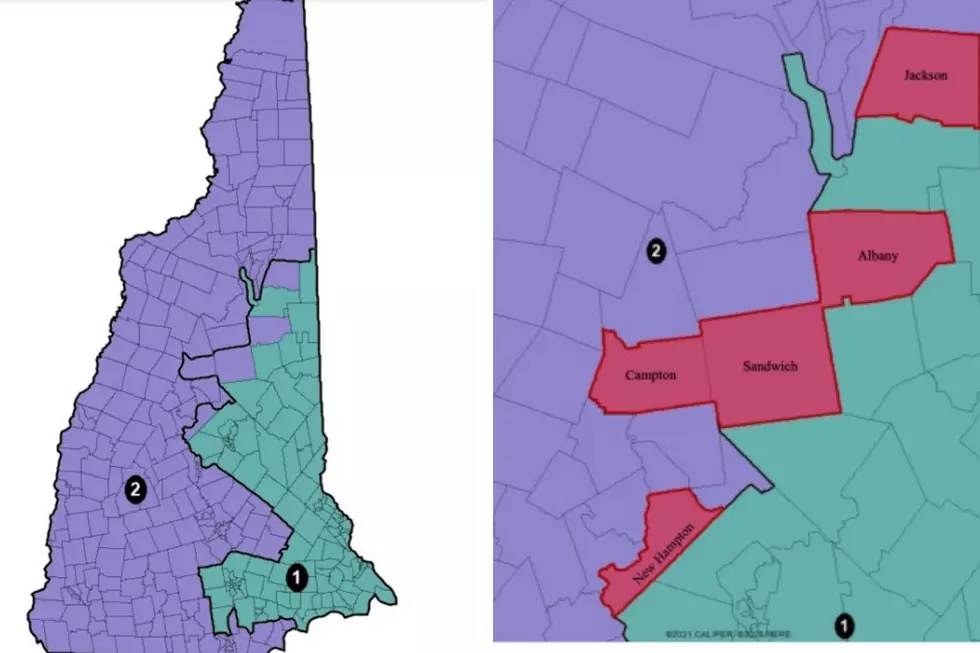
Court Gets NH Congressional Redistricting After Sununu Veto
New Hampshire has a new congressional map drawn by a state Supreme Court Special Master after four proposals were submitted and rejected.
States are required to redistrict every ten years based on results of the census. The deadline for states to complete redistricting was Friday. New Hampshire was the last state to submit its new maps.
"New Hampshire is the last state in the union to enact its congressional districts.
With only two districts, relatively little population shift over the past decade, and a limited number of legal constraints as compared to other states, one might be puzzled as to why this process is 'going down to the wire,' requiring court involvement," special master Nathaniel Persily wrote in his report.
"Although court involvement may be an 'unwelcome obligation,' it remains an obligation nonetheless if one-person, one-vote is to be respected and the state fails to remedy the malapportionment in the existing map," Persily wrote.
The map proposed by the special master will move five towns — Albany, Campton, Jackson, New Hampton, and Sandwich — from the first to second congressional district, and create two nearly equally populated districts.
"Contrary to suggestions made by the parties, however, a perfect population plan
can be achieved by moving whole towns containing the exact number of people necessary to achieve a one-person deviation between the two districts," Persily wrote.
Persily also said his plan complies with the court's order imposing a "least change" principal.
Previous Congressional Redistricting Proposals
Some states leave redistricting to the court, according to SNHU Civic Scholar and the founder of NH Political Capital Dean Spiliotes.
"There's no guarantee that the maps will be impartial, but certainly an improvement over what we've seen from the Republican majority in the state legislature thus far," Spiliotes told Seacoast Current. "Also it gives Gov. Sununu a bit of political cover."
The first proposed map from the legislature would have created a Republican-heavy First Congressional District by moving 75 towns and 358,976 people, roughly one quarter of the state's population between the two congressional districts. It would have had a balance of population of 688,764 in each district.
A second plan would have moved six entire towns to the Second Congressional District and maintain the balance of populations. A third plan would have moved just one town, Hampstead, into the Second Congressional District.
The fourth plan would have shifted six towns from the second district to the first and nine towns into the first. Incumbents Chris Pappas and Annue Kunster would have been in the same district. Gov. Chris Sununu vetoed this proposal Friday, sending the issue to the court.
"The citizens of New Hampshire will not accept Senate Bill 200, which moves both
members of Congress into the same district. Also, by moving Manchester into Congressional District 2 we would be creating a single district dominated by our largest urban areas," Sununu said in his veto message of the Senate bill.
"House Bill 52 is not in the best interest of New Hampshire. Granite Staters' expect
districts that hold our incumbents accountable so that no one elected official is immune from challengers or constituent services," Sununu said in his veto message for the House bill. "Appropriately apportioned congressional districts are vital to a representative government."
Rep. Ross Berry (R-Manchester) anticipated Sununu's veto in a statement and speculated this could have been his plan all along.
“From the beginning, the House has been willing to work with the governor on this constitutionally required process. For a reason that still escapes us, the governor has repeatedly decided to not participate in good faith despite our multiple requests for cooperation. Trying to accommodate all the changes and His Excellency’s demands was exhausting," Berry wrote.
House Democrats were also critical of the court having to draw up the redistricting maps.
"If @NHGOP majority had been willing to work with Democrats, we could have had this map months ago without court involvement," House Democrats wrote on their Twitter account. "Every taxpayer dollar spent on this case is a direct result of the GOP's inability to put partisanship aside and redistrict in a fair manner."
The next step is oral arguments about the special master's map Tuesday at 9 a.m..
Contact reporter Dan Alexander at Dan.Alexander@townsquaremedia.com or via Twitter @DanAlexanderNH
Trending Stories for Seacoast Current (May 16-22, 2022)
More From Seacoast Current








